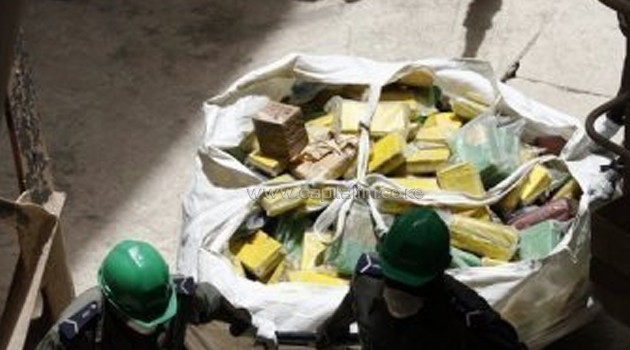Between 2003 and 2008, the UNODC said 2,418 kilogrammes (5,330 pounds) of cocaine and 61,958 kilogrammes of marijuana were seized in Ghana.
Between 2007 and 2008, seizures of cocaine jumped from 283 kilogrammes to 841 kilogrammes, the office reported.
That amount was the highest reported of any west African country for the year, though many countries like Mali, Liberia and Senegal didn’t submit statistics for that period, the UNODC report said.
“It might have been an increase in using Ghana as a transit point and then the effectiveness and efficiency of law enforcement,” said Bernard Henebeng Asamoah, the UNODC coordinator in the country, of the high numbers for those years.
Recently however, drug seizures have been dropping in Ghana. In 2011, police confiscated only 25 kilogrammes of cocaine and 153 kilogrammes of marijuana, the UNODC says.
Elsewhere, cocaine from Ghana has turned up at London’s Heathrow airport stuffed inside plantain peels, or in the stomachs of couriers who died when the pellets of cocaine exploded inside their bodies.
‘Ghana plays a key role’
Kwesi Aning, director of research at the Kofi Annan International Peacekeeping Training Centre in the capital Accra, said traffickers prefer Ghana for a reason any entrepreneur can relate to: it’s an easy place to do business.
From Ghana, travellers can fly directly to Cairo and Dubai, Amsterdam, London and Frankfurt and New York City.
Ghana also sports a relatively decent system of paved roads, with little of the banditry seen elsewhere in the region.
The same is not true of Mali, Guinea-Bissau and other west African nations.
“In this business I think Ghana plays a key role,” Aning said. “Increasingly, the drug lords don’t like Guinea-Bissau because it’s too fragile.”
Geographically, west Africa is appealing as it lies relatively close to the major European and Asian markets, said Solomon EYO, director of education for Ghana’s Narcotics Control Board.
President John Atta Mills, who took power in 2009 and died in office last year, was concerned with how the airport had become a drug corridor, according to cables from the US Embassy in Accra.
Worried that people with access to the airport’s VIP lounge including members of his own entourage might be smuggling drugs, Mills wanted to increase security on the lounge. He set an example by personally submitting to screening for drugs on his journeys out of the country.
But under the presidency of John Kufuor from 2000 to 2008, the cables tell a different story: suspicions of widespread corruption, including instances where airport security was suspected of tipping off smugglers.
“The problems at the airports and the ports demonstrates to you the infiltration of the security services,” Aning says.
Ghana has taken steps to address the issues at the airport, says Asamoah of the UNODC. This month, Ghana’s security agency rolled out a program to better coordinate their efforts at the airport.
Meanwhile, the government is looking for donor support for a $25 million plan that would pay for things like drug-sniffing dogs and hiring advisors to fighting trafficking. So far, only $154,000 has been pledged, Asamoah said.









































